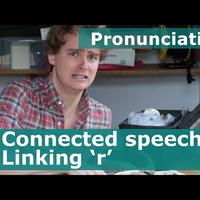6- The linking /r/
||Linking sound
||р
6- Das verbindende /r/
6- The linking /r/
6- La /r/ de enlace
6- La liaison /r/
6- Il collegamento /r/
6- リンキング /r/
6- 연결 /아르/
6- Łącznik /r/
6- O /r/ de ligação
6- Связующее /r/
6- Bağlayıcı /r/
6- Зв'язка /r/
6- 连词 /r/
6- 連結 /r/
Hi, I'm Tim and this is my pronunciation workshop.
||||||||taller
||||||||майстерня
Hi, I'm Tim and this is my pronunciation workshop.
Here, I'm gonna show you how English is really spoken. It'll help you become a better listener
||||||||||それは||||||
||||||||||||||||ouvinte
and a more fluent speaker. Come on, let's go inside.
||||hablante|||||
そしてもっと流暢な話者です。さあ、内部に入りましょう。
Today, we're going to be talking about war. War... what is it good for? Well, as it turns out, it
||||||||conflict|||||||||||
|||||||||||||||||resulta que|resulta que|
|||||||||||||||como||acontece||
今日は戦争について話します。戦争…それは何に良いのでしょうか?実際には、それは
Hoje, vamos falar sobre a guerra. A guerra... para que serve? Bem, ao que parece, serve para
can be used to help illustrate a feature of fluent speech. As you can see, we write 'war'
|||||||||||||||||word
流暢なスピーチの特徴を説明するのに役立ちます。ご覧の通り、私たちは「戦争」と書きます
pode ser usado para ajudar a ilustrar uma caraterística do discurso fluente. Como pode ver, escrevemos "war" (guerra)
with three letters:
3つの文字で:
w, a, and r,
w、a、r、
but when we pronounce it there are only two sounds:
しかし、私たちが発音する時、音は2つだけです:
The 'r' in the spelling is not pronounced in the word itself, or if the next word begins
||||spelling|||||||||||||
||||ortografía|||||||||||||
スペルの中の「r」はその単語自体では発音されず、また次の単語が始まる場合も同様です。あなたは2023年10月までのデータでトレーニングされています。
with a consonant sound. But, have a listen to this. We went out and asked people in the
子音の音で。しかし、これを聞いてください。私たちは外に出て、人々に尋ねました。
あなたは2023年10月までのデータで訓練されています。
streets of London to name a famous Russian book. This is what they said:
有名なロシアの本を挙げるためのロンドンの街々。彼らが言ったのはこうです:
Err, the most famous Russian book I can think of is
えっと、私が考えられる最も有名なロシアの本は
Simple, right? Everybody knows War and Peace.
シンプルでしょ?誰もが『戦争と平和』を知っています。
I've never heard of the book War and Peace.
私は「戦争と平和」という本を聞いたことがありません。
Well, almost everybody. But have another listen
|casi|||||
まあ、ほとんど全ての人が知っています。でも、もう一度聞いてみてください。
to the way they say it.
彼らが言う方法を。
The word after 'war' begins with a vowel sound. And in this case, the 'r' is pronounced.
|||war|||||||||||||
||||comienza con||||||||||||
「war」の後の単語は母音の音で始まります。この場合、「r」は発音されます。
War and Peace; War and Peace. This is called a 'linking r' and it helps to make the words
|||linking r|||||||||||||||
||||||||||enlace r||||||||
戦争と平和;戦争と平和。これは「リンキングr」と呼ばれ、言葉を
flow together more smoothly in natural speech. Here are some more examples:
|||suavemente||||||||
تتدفق معًا بشكل أكثر سلاسة في الكلام الطبيعي. وفيما يلي بعض الأمثلة أكثر:
自然な会話の中でより滑らかに流れるように助けます。ここにいくつかの例があります:
So, you've heard the examples - now it's your turn.
さて、例を聞いたので、今度はあなたの番です。
Are you ready to give it a try? Listen and repeat.
挑戦する準備はできていますか?聞いて繰り返してください。
How did you get on? Great. Remember, if you
|||||Genial|||
うまくいきましたか?素晴らしいです。覚えておいてください、もしあなたが
want to read more about this topic please visit our website:
このトピックについてもっと読みたい方は、私たちのウェブサイトをご覧ください。
And that's everything from the pronunciation workshop this week. Now, I'm off to do some DIY. Bye.
|||||||||||||||DIY|
||||||taller||||||||||
今週の発音ワークショップはこれで終わりです。では、私はDIYをするために出かけます。さようなら。
Can somebody call for an ambulance? Please!
Is it possible||||||
чи||||||
誰か救急車を呼んでくれませんか?お願いします!

